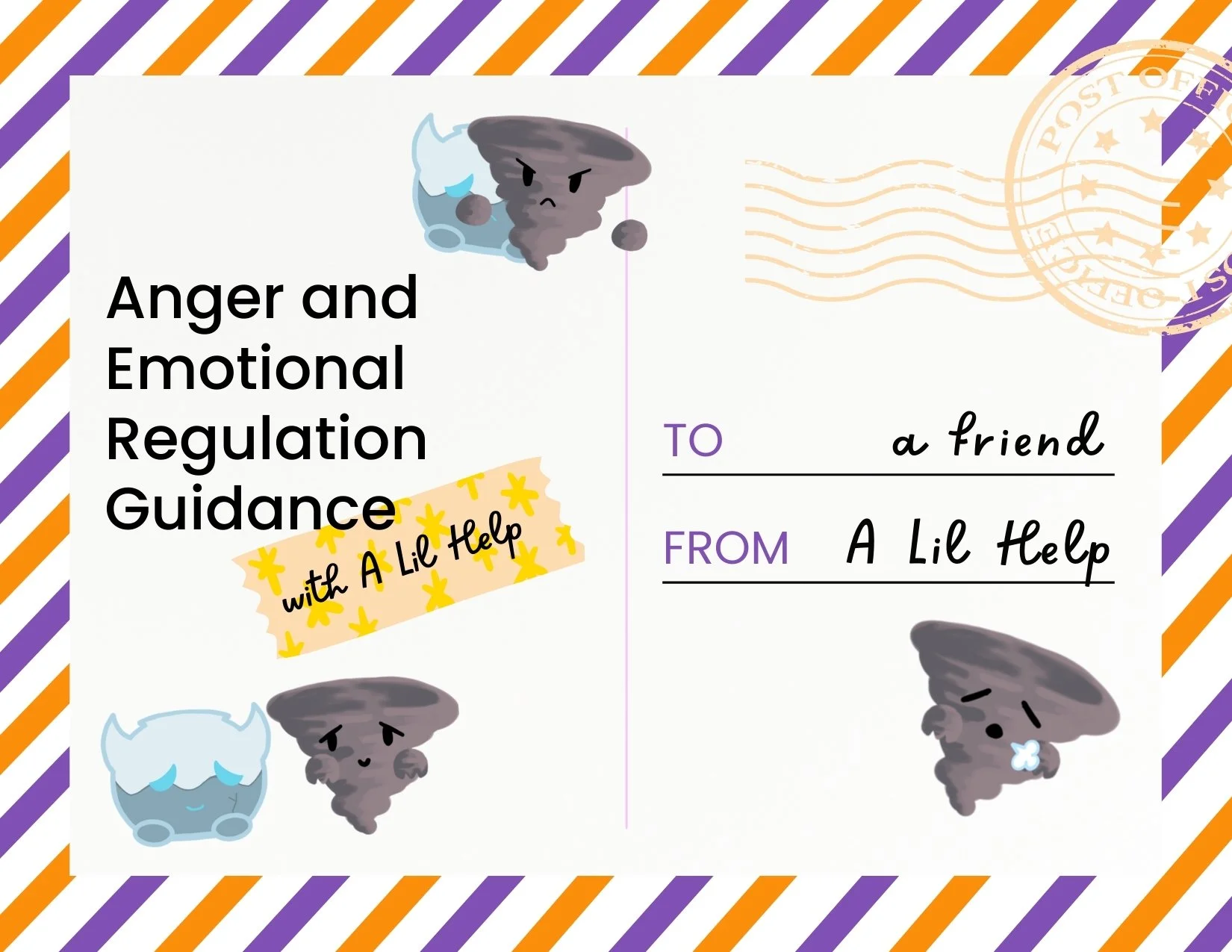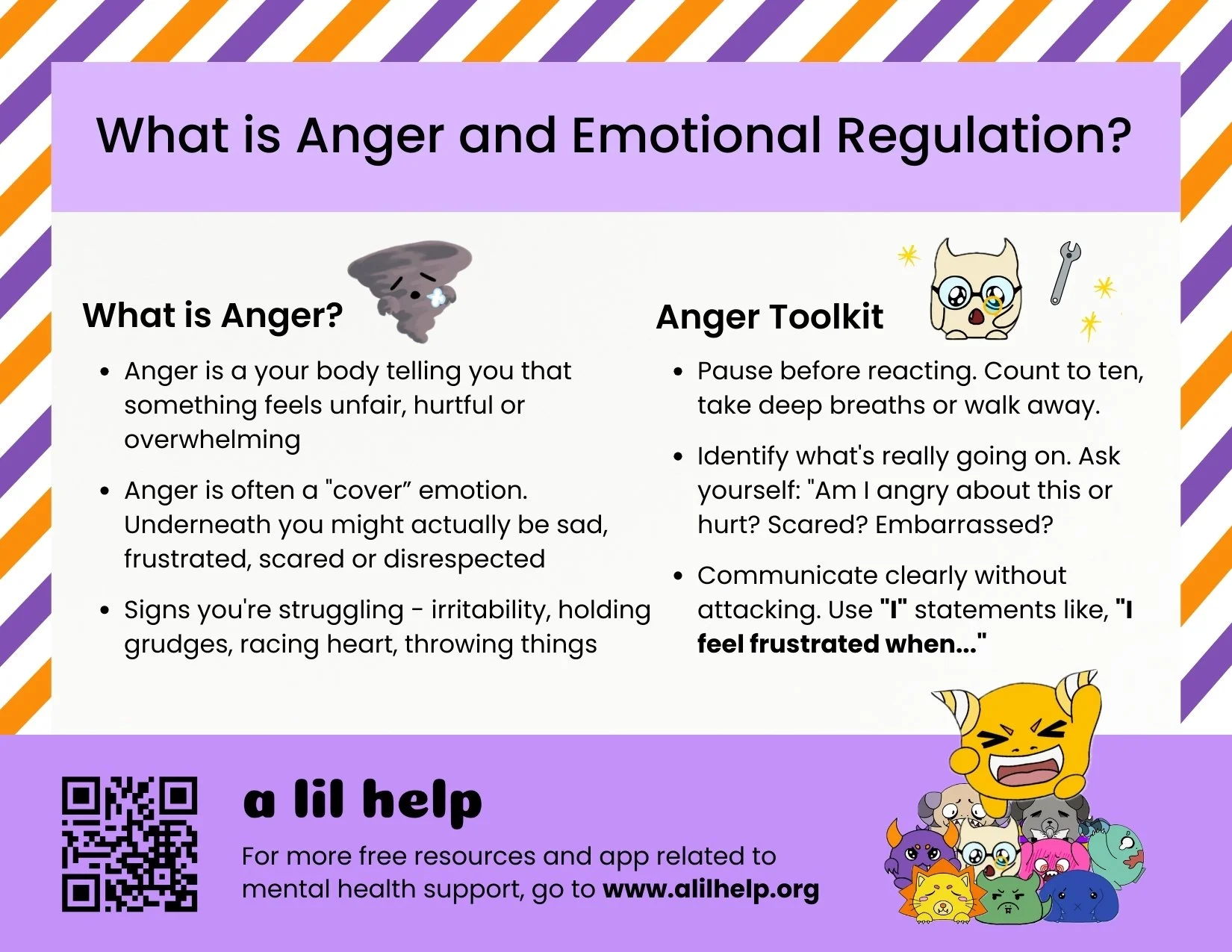

Remember
Being angry isn’t a bad thing. It’s your body telling you that something isn’t going as planned and learning how to regulate these emotions can help you
What Is Anger and Emotional Regulation?
Written by Stella V. Wong
Picture this: You have a super stressful day and when you get home your family starts to annoy you. You feel your chest tighten, your face gets hot, and suddenly everyone around you is your least favorite person, even people who had nothing to do with it. Maybe you yell, slam a door, or say something you don’t mean. Later, you feel guilty or embarrassed, but in the moment, it feels impossible to control. That’s anger without emotional regulation.
Anger is a completely normal, natural emotion that everyone feels. It’s a signal that something feels unfair, overwhelming or hurtful. Learning to understand your anger, recognize your triggers, and express it in healthy ways is called emotional regulation, and it's one of the most important skills you can develop for your mental health and relationships.
What is Actually Going On Here?
Let's break down the vocab real quick:
💜 Anger: An emotion that shows up when you feel threatened, misunderstood, stressed, or hurt. It can range from mild irritation to intense rage.
💜 Triggers: Situations, thoughts, or experiences that spark emotional reactions. Triggers are different for everyone. What sets someone else off might be no big deal to you.
💜 Emotional Regulation: The ability to understand your emotions, manage them, and express them in healthy ways. It doesn’t mean staying calm 24/7. It means knowing how to slow down, breathe, and choose what to do next.
💜 Anger vs. Aggression:
✔️Feeling angry = normal emotion.
✔️Acting aggressively (yelling, threatening, lashing out) = harmful behavior.
💜 Emotional Regulation: Managing your emotions in healthy ways so they don’t control you. It's not about stuffing feelings down or pretending you’re not upset. Choose how to respond instead of just reacting on impulse. Respond instead of explode.
💜 Suppressed Anger vs. Explosive Anger: Some people bottle everything up until they explode. Others constantly react to every little thing. Neither is healthy.
Myth Buster
✖️ Myth: Anger should be avoided or suppressed at all costs. Feeling angry makes you a bad person.
✔️ Fact: Anger is a natural, normal emotion. Everyone feels it. What matters is how you handle it. Suppressing anger doesn’t make it go away and it might come out in unhealthy ways later.
Why Does This Happen?
Anger is often a “cover” emotion. Underneath it, there might be:
✔️ frustration
✔️ sadness
✔️ embarrassment
✔️ feeling disrespected
✔️ stress or pressure
✔️ fear of being judged or misunderstood
✔️ lack of sleep or hunger (yes, hangry is real)
✔️feeling powerless or unable to control a situation
✔️ past trauma or unresolved hurt
✔️ just having a bad day where everything piles up (overwhelmed)
When you don’t slow down to understand what’s underneath, anger can burst out in ways you regret.
Key signs you’re struggling to regulate anger include:
✔️ irritability
✔️ shouting or snapping at others
✔️ frequent frustration
✔️ passive-aggressive behavior like silent treatment, sarcastic comments
✔️ shutting down or storming off, holding grudges
✔️ saying hurtful things you regret later
✔️ physical reactions - clenched fists, racing heart, feeling hot, tense muscles
✔️ physical aggression – slamming doors, throwing days, pushing, hitting
Example: Snapping at a loved one, even though they didn’t do anything wrong but because you’re exhausted, overwhelmed, or stressed about something else.
Why Emotional Regulation Matters
Once you start noticing the triggers, like “I always get angry when I get interrupted” or “I snap at people when I skip lunch,” then you can start managing those triggers instead of just reacting to them. When you don’t regulate your emotions, anger can seriously damage your relationships and your mental health.
Why Emotional Regulation Matters
💜 Recognize the early signs. Notice when anger starts building. Maybe your jaw clenches, your breathing gets shallow, or your thoughts start racing. Catching it early makes it easier to manage before you explode.
💜 Pause before reacting. Count to ten. Forwards or backwards. Take deep breaths. Walk away from the situation if you need to. Give yourself space to cool down.
💜 Use physical outlets. Exercise, go for a run, jump up and down. Move your body to release the physical energy anger creates.
💜 Identify what’s really going on. Ask yourself: “Am I actually angry about this, or am I hurt? Scared? Embarrassed?”
💜 Communicate clearly without attacking. Use “I” statements like “I feel frustrated when you interrupt me because it seems like my opinion doesn’t matter.” This is way more effective than “You never listen to me!”
💜 Get enough sleep, eat regularly, and manage stress. When you’re exhausted, hungry, or overwhelmed, your emotional regulation tanks. Basic self-care makes a huge difference.
The Bottom Line
Anger isn’t the enemy. It’s a message from your mind and body saying, “Something is not right.” Emotional regulation helps you understand that message and choose how to react, without hurting yourself or others.
DISCLAIMER: This article is for informational and educational purposes only, from publicly available information. It is not medical or professional advice. If you’re struggling, talk to a trusted adult, counselor, or healthcare professional.
